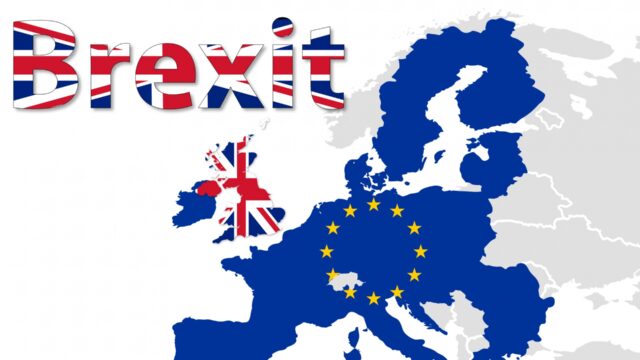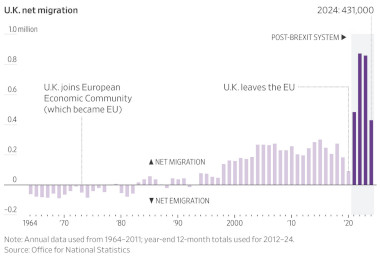They Voted for Brexit to Stop Immigration Only to Get More of It

What good are democracies when the outcome of elections bring the opposite of what voters wish?
In June 2016 the United Kingdom voted for Brexit:
The 2016 United Kingdom European Union membership referendum, commonly referred to as the EU referendum or the Brexit referendum, was a referendum that took place on 23 June 2016 in the United Kingdom (UK) and Gibraltar under the provisions of the European Union Referendum Act 2015 to ask the electorate whether the country should continue to remain a member of, or leave, the European Union (EU). The result was a vote in favour of leaving the EU, triggering calls to begin the process of the country’s withdrawal from the EU commonly termed “Brexit”.
A main public issue in the run-up to the vote was immigration:
The Brexit vote will be debated for years to come. But the story is straightforward. Propagated by an unlikely pair of effective messengers, Leave’s “Take Back Control” message harnessed the motive power of immigration, an emotionally charged issue that had been baked into British psychology long before the vote was called. These immigration fears, not abstract concerns about a “democratic deficit” that required rescuing UK sovereignty from Brussels bureaucrats, do much to explain why Britain voted for Brexit.
Demagogues like Nigel Farage played a key role in this:
The rise of Nigel Farage and the UK Independence Party (UKIP) also played an important role in cultivating this concern among economically left-behind voters. Between 2013 and 2015 UKIP began to mobilise these voters into politics, convincing them that the issues of immigration and the EU were deeply entwined. At the 2016 referendum the vote for Brexit was strongest in areas that had given UKIP strong support two years previously. Had these voters not been galvanised by UKIP then it is unlikely they would have turned out in the numbers that we saw on June 23rd, 2016. Indeed, we also find that if somebody felt anxious over the immigration issue, and economically left behind, they were significantly more likely to vote in the referendum.
It took three and a half years to finally executed the Brexit move. The results following it though were not what people had expected:

As the Wall Street Journal writes (archived):
The Tories, despite repeatedly promising lower overall immigration levels, soon lost control of the system they designed, triggering the biggest influx of legal migration the country has ever seen. In just one job field, care aides who look after the infirm or elderly, one government forecast assumed some 6,000 migrants a year would come to work. In the space of four years, 679,900 carers and their families arrived, government figures show.
In total, 4.5 million people arrived in Britain between 2021 and 2024, primarily from India, Nigeria and China. One in every 25 people living in the U.K. today came during that four-year window.
In comparison, the U.S. typically averages about one million new lawful permanent residents, or green card holders, a year—to a country with a total population five times the size of Britain’s.
After Boris Johnson, who had campaigned for Brexit, had become Prime Minister he implemented an industry friendly, extremely liberal immigration policy. Workers from Europe were shunned but everybody else was welcome:
Employers no longer had to try to hire workers from Britain before recruiting from abroad. To acquire a skilled-worker visa, foreign workers weren’t required to have a college degree, they just had to be offered a job with a minimum salary of £25,600, which at the time was 23% below the full-time U.K. median salary.
There were also carve-outs. Firms could sponsor visas in certain sectors, such as construction, where there was an acute shortage of workers, paying them as little as £20,400 a year. And students could come with their families for a one-year master’s course, and stay on for two years after completing their studies. Net migration from the EU went into reverse, and arrivals from elsewhere surged. In 2021, 93,000 people arrived from India. By 2024, that number was 240,000. The number of Nigerian migrants increased fivefold in the same period.
Many arrived with families in tow. In the 12 months ending March 2024, nearly half of all visas were issued to dependents, not workers.
It is thereby not astonishing to find that Farage is back:
This sudden demographic shift, which has come at a time of economic stagnation and piled pressure on Britain’s stretched public services, is roiling the country’s politics. Immigration is now voters’ top concern. Reform UK, which says it would freeze most migration and deport those who arrive illegally, got the most votes of any party in recent municipal elections. The Tories, having lost power last year to the Labour Party, are now a distant third in the polls.
The 61-year-old Farage, long dismissed in Westminster as influential but unelectable, is now being taken seriously as a possible prime minister, though national elections are unlikely before 2029.
I doubt that voting for Farage would change a thing.
